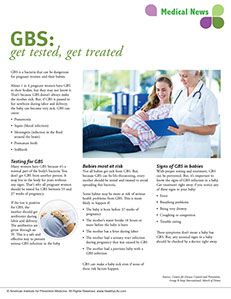SYMPTOM CHECKER
CONDITIONS
Male
Female
Child
Arm, Hand & Shoulder Concerns
Legs & Feet Concerns
Dental & Mouth Concerns
Ear & Nose
Eye Conditions
Head Conditions
Arm, Hand & Shoulder Concerns
Legs & Feet Concerns
Front
Back
Arm, Hand & Shoulder Concerns
Dental & Mouth Concerns
Ear & Nose
Eye Conditions
Head Conditions
Arm, Hand & Shoulder Concerns
Dental & Mouth Concerns
Ear & Nose
Eye Conditions
Head Conditions
Front
Back
Arm, Hand & Shoulder Concerns
Neck Links
Head & Neck Concerns
Arm, Hand & Shoulder Concerns
Neck Links
Head & Neck Concerns
Front
Back
Online Clinic
Wise Healthcare
GBS: get tested, get treated

Print on Demand
GBS is a bacteria that can be dangerous for pregnant women and their babies.
About 1 in 4 pregnant women have GBS in their bodies, but they may not know it. That’s because GBS doesn’t always make the mother sick. But, if GBS is passed to her newborn during labor and delivery, the baby can become very sick. GBS can cause:
• Pneumonia
• Sepsis (blood infection)
• Meningitis (infection in the fluid around the brain)
• Premature birth
• Stillbirth
Testing for GBS
Many women have GBS because it’s a normal part of the body’s bacteria. You don’t get GBS from another person. It may live in the body for years without any signs. That’s why all pregnant women should be tested for GBS between 35 and 37 weeks of pregnancy.
If the test is positive for GBS, the mother should get antibiotics during labor and delivery. The antibiotics are given through an IV. This is a safe and effective way to prevent serious GBS infection in the baby.
Babies most at risk
Not all babies get sick from GBS. But, because GBS can be life-threatening, every mother should be tested and treated to avoid spreading this bacteria.
Some babies may be more at risk of serious health problems from GBS. This is more likely to happen if:
• The baby is born before 37 weeks of pregnancy
• The mother’s water breaks 18 hours or more before the baby is born
• The mother has a fever during labor
• The mother had a urinary tract infection during pregnancy that was caused by GBS
• The mother had a previous baby with a GBS infection
GBS can make a baby sick even if none of these risk factors happen.
Signs of GBS in babies
With proper testing and treatment, GBS can be prevented. But, it’s important to know the signs of GBS infection in a baby. Get treatment right away if you notice any of these signs in your baby:
• Fever
• Breathing problems
• Being very drowsy
• Coughing or congestion
• Trouble eating
These symptoms don’t mean a baby has GBS. But, any unusual signs in a baby should be checked by a doctor right away.
Sources: Centers for Disease Control and Prevention, Group B Strep International, March of Dimes
This website is not meant to substitute for expert medical advice or treatment. Follow your doctor’s or health care provider’s advice if it differs from what is given in this guide.
The American Institute for Preventive Medicine (AIPM) is not responsible for the availability or content of external sites, nor does AIPM endorse them. Also, it is the responsibility of the user to examine the copyright and licensing restrictions of external pages and to secure all necessary permission.
The content on this website is proprietary. You may not modify, copy, reproduce, republish, upload, post, transmit, or distribute, in any manner, the material on the website without the written permission of AIPM.
2021 © American Institute for Preventive Medicine - All Rights Reserved. Disclaimer | www.HealthyLife.com














































_web-u573076-fr.jpg?crc=4106038948)

